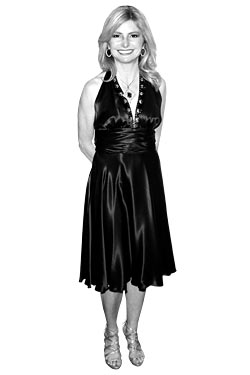
Lisa Bloom has ten minutes to get from Sun in Bloom, a vegan restaurant in Park Slope, to Sacred, a dance studio in Bed-Stuy. “Most of the cabs around here are gypsies,” she mutters. Spotting a licensed—but off-duty—taxi, she sticks out a tiny, white-cardigan-clad arm. The driver pulls over and asks where we’re headed. “Oh, please, please, please,” Bloom says, with an exaggerated frown. Our ride procured, I compliment her on her persuasive powers as her phone starts ringing (it’s her daughter, a recent Penn grad). “Mike,” she says, glancing at the BlackBerry, “I’m an attorney.”
Specifically, Bloom is a high-powered L.A. attorney and the founder of the Bloom Firm, whose practice is “98 percent” ordinary people and 2 percent people like Michael Lohan and reputed White House party crasher Michaele Salahi. Her other titles include but are not limited to talking head on CNN and CBS; daughter of Gloria Allred; Yale Law grad; onetime national debate-team champion; two-time divorcée; and fiancée to a handsome entrepreneur, who proposed last month on a glacier in Argentina. (There’s also “hottie,” which was bestowed by Wonkette.) Now, with the release of her quasi–advice book Think: Straight Talk for Women to Stay Smart in a Dumbed-Down World, Bloom adds “author” to that list, and from there, with luck, “all-purpose lifestyle guru.”
In Think, Bloom offers pointers on sex and relationships and encourages girls to choose brains over fame and read the Times rather than the tabloids. The irony—celebrity lawyer blasts celebrity culture—is not entirely lost on her. “My clients are human beings with legal problems, whether they’re famous or not,” she says in the cab, now glancing at her iPad, from which she’s directing the driver. “Everyone in the media defamed the Salahis by calling them ‘party crashers’ without any evidence. When somebody is accused of rape, you call them an ‘alleged rapist.’ Somehow, that didn’t apply.” She’s more conflicted about her on-air punditry on pop-culture cases, like Britney Spears’s custody battles or the celebrity divorce du jour. “CBS I work for, and I’m going to do whatever stories they assign me. On the other networks, I have a choice … And would I rather talk about the war-crimes tribunal in Cambodia, which I went to on my own, pitched, and not a single network would have me discuss, even when I said I’d discuss it along with two other legal issues? Yes. But the change has to come from consumers. That’s why I wrote the book.”
At Sacred, Bloom introduces me to her friend Rochelle Schieck, the proud founder of Qoya, which she calls a blend of “yoga, dance, and sensual movement,” and which Bloom practices regularly. I am not only the only man in today’s class, I am informed, but the only man who’s ever been permitted to attend one. It becomes apparent why: In the spacious studio, the women grab scattered poles and wrap their legs around them, climbing upward and twirling their way down. The windows fog up as one woman undulates on the sill. The women dance together, too. Standing, one woman spreads her legs wide while another crawls in between them, shouting and pounding the floor. “Sorry,” Lisa whispers. “I should have warned you. It gets a little nuts in here.”
Before class began, Lisa apologized in advance for her moves—“I hurt my knee jogging, so I might look a little funny”—but she was either being self-deprecating or just lying: She is a mesmerizing Qoya dancer. In a white tank top and black sweats, she glides her fingers across her stomach, taps her feet, and rocks her hips, her blonde hair falling to her shoulders. It gets to the point where I feel the need to avert my eyes, even though I am gay. “Sometimes these movements are perceived as sexy,” Schieck shouts, as “Lady Marmalade” plays over the speakers. “But this is for you! Do this for you!”
Afterward, outside Sacred, it is drizzling on Clifton Place. Schieck had instructed us to dedicate our Qoya movements to something, and I ask to whom or what Bloom had devoted hers. She hesitates before answering. “Prosperity. I wrote a book, and I’d like to write more. I know when you’re an artist or a writer, you’re not supposed to think like that. But my fiancé and I, we’d like a life of traveling and working. So I hoped for success.” Tired from her workout, Bloom’s ready to head back to the Park Slope apartment where she’s staying for the week. “I have to get up at dawn for an appearance on The Early Show,” she says as she heads off. “I’ll be discussing Schwarzenegger and Shriver.”
Have good intel? Send tips to intel@nymag.com.